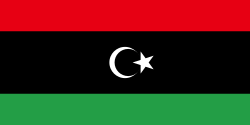|
|---|
| No. | Name | Portrait | Lifespan | Term of office | Political affiliation |
|---|
| Took office | Left office | Time in office |
|---|
| 1 | Mahmud al-Muntasir | 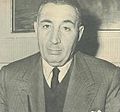 | 1903–1970 | 29 March 1951 | 19 February 1954 | 2 years, 327 days | Independent |
|---|
| Prime Minister. First tenure in the office. Served in acting capacity until 24 December 1951. |
| 2 | Muhammad Sakizli |  | 1892–1976 | 19 February 1954 | 12 April 1954 | 52 days | Independent |
|---|
| Prime Minister. |
| 3 | Mustafa Ben Halim |  | 1921–2021 | 12 April 1954 | 26 May 1957 | 3 years, 44 days | Independent |
|---|
| Prime Minister. |
| 4 | Abdul Majid Kabar |  | 1909–1988 | 26 May 1957 | 17 October 1960 | 3 years, 144 days | Independent |
|---|
| Prime Minister. |
| 5 | Muhammad Osman Said |  | 1924–2007 | 17 October 1960 | 19 March 1963 | 2 years, 153 days | Independent |
|---|
| Prime Minister. |
| 6 | Mohieddin Fikini |  | 1925–1994 | 19 March 1963 | 20 January 1964 | 307 days | Independent |
|---|
| Prime Minister. |
| (1) | Mahmud al-Muntasir |  | 1903–1970 | 20 January 1964 | 20 March 1965 | 1 year, 59 days | Independent |
|---|
| Prime Minister. Second tenure in the office. |
| 7 | Hussein Maziq |  | 1918–2006 | 20 March 1965 | 2 July 1967 | 2 years, 104 days | Independent |
|---|
| Prime Minister. |
| 8 | Abdul Qadir al-Badri |  | 1921–2003 | 2 July 1967 | 25 October 1967 | 115 days | Independent |
|---|
| Prime Minister. |
| 9 | Abdul Hamid al-Bakkoush |  | 1933–2007 | 25 October 1967 | 4 September 1968 | 315 days | Independent |
|---|
| Prime Minister. |
| 10 | Wanis al-Qaddafi |  | 1922–1986 | 4 September 1968 | 31 August 1969 | 361 days | Independent |
|---|
| Prime Minister. Deposed in the 1969 revolution. |
|
|---|
| 11 | Mahmud Suleiman Maghribi |  | 1935–2009 | 8 September 1969 | 16 January 1970 | 130 days | Independent |
|---|
| Prime Minister. |
| 12 | Muammar Gaddafi |  | 1942–2011 | 16 January 1970 | 16 July 1972 | 2 years, 182 days | Military /
Arab Socialist Union |
|---|
| Prime Minister. Simultaneously served as the Chairman of the Revolutionary Command Council (RCC). |
| 13 | Abdessalam Jalloud |  | born 1944 | 16 July 1972 | 2 March 1977 | 4 years, 229 days | Military /
Arab Socialist Union |
|---|
| Prime Minister. |
|
|---|
| 14 | Abdul Ati al-Obeidi |  | 1939–2023 | 2 March 1977 | 2 March 1979 | 2 years | Independent
(Islamic socialist) |
|---|
| Secretary-General of the General People's Committee (GPCO). Afterwards served as Secretary-General of the General People's Congress (head of state), from 1979 to 1981. |
| 15 | Jadallah Azzuz at-Talhi |  | 1939–2024 | 2 March 1979 | 16 February 1984 | 4 years, 351 days | Independent
(Islamic socialist) |
|---|
| Secretary-General of the GPCO. First tenure in the office. |
| 16 | Muhammad az-Zaruq Rajab |  | born 1940 | 16 February 1984 | 3 March 1986 | 2 years, 15 days | Independent
(Islamic socialist) |
|---|
| Secretary-General of the GPCO. Previously served as Secretary-General of the General People's Congress (head of state), from 1981 to 1984. Afterwards served as Governor of the Central Bank of Libya, from 1987 to 1990 and in 2011. |
| (15) | Jadallah Azzuz at-Talhi |  | 1939–2024 | 3 March 1986 | 1 March 1987 | 363 days | Independent
(Islamic socialist) |
|---|
| Secretary-General of the GPCO. Second tenure in the office. Served at the time of the 1986 United States bombing (Operation El Dorado Canyon). |
| 17 | Umar Mustafa Al Muntasir |  | 1939–2001 | 1 March 1987 [7] | 7 October 1990 | 3 years, 220 days | Independent
(Islamic socialist) |
|---|
| Secretary-General of the GPCO. |
| 18 | Abuzed Omar Dorda |  | 1944–2022 | 7 October 1990 | 29 January 1994 | 3 years, 114 days | Independent
(Islamic socialist) |
|---|
| Secretary-General of the GPCO. Afterwards served as head of the Mukhabarat el-Jamahiriya (national intelligence service), from 2009 to 2011. [8] [9] |
| 19 | Abdul Majid al-Qa′ud |  | 1943–2021 | 29 January 1994 | 29 December 1997 | 3 years, 334 days | Independent
(Islamic socialist) |
|---|
| Secretary-General of the GPCO. |
| 20 | Muhammad Ahmad al-Mangoush |  | 1937–2016 | 29 December 1997 | 1 March 2000 | 2 years, 63 days | Independent
(Islamic socialist) |
|---|
| Secretary-General of the GPCO. |
| 21 | Imbarek Shamekh |  | born 1952 | 1 March 2000 | 14 June 2003 | 3 years, 105 days | Independent
(Islamic socialist) |
|---|
| Secretary-General of the GPCO. Afterwards served as Secretary-General of the General People's Congress (head of state), from 2009 to 2010. |
| 22 | Shukri Ghanem | 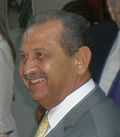 | 1942–2012 | 14 June 2003 | 5 March 2006 [10] | 2 years, 264 days | Independent
(Islamic socialist) |
|---|
| Secretary-General of the GPCO. |
| 23 | Baghdadi Mahmudi | 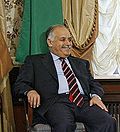 | born 1945 | 5 March 2006 | 23 August 2011 | 5 years, 171 days | Independent
(Islamic socialist) |
|---|
| Secretary-General of the GPCO. Served at the time of the First Civil War and the concurrent foreign military intervention. Deposed during the Battle of Tripoli. |
|
|---|
| 24 | Mahmoud Jibril | 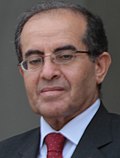 | 1952–2020 | 5 March 2011 | 23 October 2011 | 232 days | Independent |
|---|
| Prime Minister; served as Head of the Executive Team of the National Transitional Council (NTC) until 23 March 2011. In rebellion to 23 August 2011, based in Benghazi during this period. |
| — | Ali Tarhouni |  | born 1951 | 23 October 2011 | 24 November 2011 | 32 days | Independent |
|---|
| Deputy Prime Minister, assumed office as caretaker. |
| — | Abdurrahim El-Keib |  | 1950–2020 | 24 November 2011 | 14 November 2012 | 356 days | Independent |
|---|
| Acting Prime Minister. |
| 25 | Ali Zeidan |  | born 1950 | 14 November 2012 | 11 March 2014 | 1 year, 117 days | National Party for Development and Welfare |
|---|
| Prime Minister. Briefly kidnapped by armed militants during the 2013 coup attempt. Survived the February 2014 coup attempt. |
|
|---|
| Following the 2014 parliamentary election, the government was split between the newly-elected House of Representatives (HoR) and the outgoing General National Congress (GNC), resulting in the Second Civil War. The 2014 elections were declared invalid by the Supreme Court in November 2014. [11] |
|
|---|
| 26 | Abdullah al-Theni |  | born 1954 | 11 March 2014 | 5 April 2016 | 2 years, 25 days | Independent |
|---|
| Prime Minister. In rebellion, based in Tobruk from August 2014, then in Bayda. Internationally recognized until 12 March 2016. Served in acting capacity until 8 April 2014. Survived the May 2014 coup attempt. |
| — | Ahmed Maiteeq |  | born 1972 | 25 May 2014 | 9 June 2014 | 15 days | Independent |
|---|
| Prime Minister. Appointment declared invalid by the Supreme Court. |
| — | Omar al-Hassi |  | born 1949 | 6 September 2014 | 31 March 2015 | 206 days | Independent |
|---|
| Prime Minister of the National Salvation Government (NSG). In rebellion, based in Tripoli. |
| — | Khalifa al-Ghawil |  | born 1964 | 31 March 2015 | 5 April 2016 | 1 year, 5 days | Independent |
|---|
| Prime Minister of the NSG. Served in acting capacity until 1 December 2015. In rebellion, based in Tripoli. |
|
|---|
| Following the inauguration of the Presidential Council and the Government of National Accord (GNA), the government remain split between the HoR and the NSG, recreated after the 2016 coup attempt. However, the High Council of State (HCS), based in Tripoli, recognized the GNA. |
|
|---|
| 27 | Fayez al-Sarraj |  | born 1960 | 5 April 2016 | 15 March 2021 | 4 years, 306 days | Independent |
|---|
| Prime Minister of the GNA, simultaneously served as the Chairman of the Presidential Council. Internationally recognized, based in Tripoli. |
| — | Khalifa al-Ghawil |  | born 1964 | 14 October 2016 | 16 March 2017 | 153 days | Independent |
|---|
| Prime Minister of the recreated NSG. In rebellion, based in part of Tripoli. |
| — | Abdullah al-Theni |  | born 1954 | 5 April 2016 | 15 March 2021 | 4 years, 344 days | Independent |
|---|
| Prime Minister of the HoR. Based in opposition in Tobruk. |
| 28 | Abdul Hamid Dbeibeh |  | born 1958 | 15 March 2021 | Incumbent | 4 years, 288 days | Independent |
|---|
| Prime Minister of the Government of National Unity (GNU). Internationally recognized, based in Tripoli. |
| — | Fathi Bashagha |  | born 1962 | 3 March 2022 | 16 May 2023 | 1 year, 74 days | Independent |
|---|
| Prime Minister of the Government of National Stability (GNS), supported by the HoR. Based in opposition in Sirte. [12] [13] [14] Suspended by the HoR on 16 May 2023. [15] |
| — | Osama Hammad |  | born 1979 | 16 May 2023 | Incumbent | 2 years, 226 days | Independent |
|---|
| Acting Prime Minister of the GNS, supported by the HoR. Designated Acting Prime Minister by the HoR after the suspension of Fathi Bashagha. [15] |



























